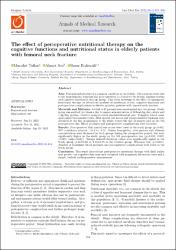| dc.contributor.author | Taflan, Mücahit | |
| dc.contributor.author | Şen, Ahmet | |
| dc.contributor.author | Erdivanlı, Başar | |
| dc.date.accessioned | 2023-03-01T07:43:17Z | |
| dc.date.available | 2023-03-01T07:43:17Z | |
| dc.date.issued | 2022 | en_US |
| dc.identifier.citation | Taflan, M. Şen, A. & Erdivanlı, B. (2022). The effect of perioperative nutritional therapy on the cognitive functions and nutritional status in elderly patients with femoral neck fracture. Annals of Medical Research, 29(4), 351-356. http://doi.org/10.5455/annalsmedres.2021.06.464 | en_US |
| dc.identifier.issn | 2636-7688 | |
| dc.identifier.uri | http://doi.org/10.5455/annalsmedres.2021.06.464 | |
| dc.identifier.uri | https://hdl.handle.net/11436/7734 | |
| dc.description.abstract | Aim: Femoral neck fracture is a common condition in the elderly. The catabolic state due
to the neurohumoral response and poor nutrition is a threat to the fitness, immune system
and cognitive functions in this age group. This study investigated the effect of a pragmatic
nutritional therapy on laboratory markers of nutritional status, cognitive functions and
postoperative complications in elective geriatric patients with femoral neck fracture.
Materials and Methods: A total of 47 patients were randomized into two groups: Study
group was audited two times a day to ensure administration of 30 kcal/kg/day calorie and
1 kg/day protein. Control group received standard hospital care. Complete blood count
and routine biochemistry tests, Mini mental test scores and triceps skinfold thickness were
obtained at the day of admission to the study, before the day of surgery and on the 5th
postoperative day. Blood products and postoperative complications were recorded.
Results: Postoperative Mini mental test scores were lower in the study group (p<0.001,
95% confidence interval: -10.4 to -5.5). Serum hemoglobin, total protein and albumin
concentrations were decreased in both groups during the preoperative period; but were
significantly higher in the study group on the 5th postoperative day (p=0.010, 0.002,
<0.001, respectively). Triceps skinfold thickness values were significantly higher in the
Study group (2.51±0.24 vs 2.23±0.28 in the Control group, Wilcoxon test, p=0.001).
Number of transfused blood products and postoperative complications were lower in the
Study group.
Conclusion: This study showed that perioperative nutritional therapy with daily audits
may protect the cognitive functions and evaluated with pragmatic laboratory tests and a
simple, bedside anthropometric measurement. | en_US |
| dc.language.iso | eng | en_US |
| dc.publisher | İnönü Üniversitesi Tıp Fakültesi | en_US |
| dc.rights | info:eu-repo/semantics/openAccess | en_US |
| dc.subject | Femoral neck fracture | en_US |
| dc.subject | Mini mental test | en_US |
| dc.title | The effect of perioperative nutritional therapy on the cognitive functions and nutritional status in elderly patients with femoral neck fracture | en_US |
| dc.type | article | en_US |
| dc.contributor.department | RTEÜ, Tıp Fakültesi, Cerrahi Tıp Bilimleri Bölümü | en_US |
| dc.contributor.institutionauthor | Erdivanlı, Başar | |
| dc.identifier.doi | 10.5455/annalsmedres.2021.06.464 | en_US |
| dc.identifier.volume | 29 | en_US |
| dc.identifier.issue | 4 | en_US |
| dc.identifier.startpage | 351 | en_US |
| dc.identifier.endpage | 356 | en_US |
| dc.relation.journal | Annals of Medical Research | en_US |
| dc.relation.publicationcategory | Makale - Uluslararası Hakemli Dergi - Kurum Öğretim Elemanı | en_US |


















